

Language and Composition. RSA Animate - Changing Paradigms. The Art Market is Less Ethical than the Stock Market. Subscribe to receive all the latest news & updates from IQ2US Privacy ReasonedAnalysis.

How Media Shapes Perception. Media. <a href=" Writing Instructor</a> Publication History: The Writing Instructor, December 2001 I would say, “Let me show you what it means to be human.”
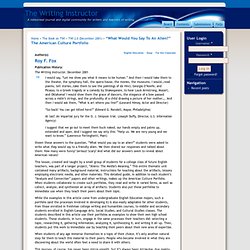
Thinking and Learning TED Ed. Language and Literature TED Ed. A Beginner's Guide to Irrational Behavior. Know Thyself. Introduction to Philosophy. Philosophy Home Page. CATA 335 - Argumentation Homework. HOMEWORK -- ASSIGNMENTS AND EXERCISES Last updated 12/4/2008 Toulmin Argument Analysis -- Practice Exercises Exercise 1 - claims, grounds and warrants - complete before class - 9/4 Exercise 2 - claims, grounds and warrants - complete before class - 9/9.
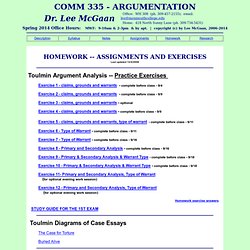
Debatabase: a world of great debates. Think Again: How to Reason and Argue. Critical Thinking in Global Challenges. About the Course Critical thinking is the ability to gather and assess information and evidence in a balanced and reflective way to reach conclusions that are justified by reasoned argument based on the available evidence.
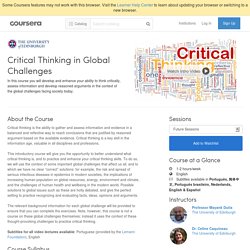
Critical thinking is a key skill in the information age, valuable in all disciplines and professions. This introductory course will give you the opportunity to better understand what critical thinking is, and to practice and enhance your critical thinking skills. To do so, we will use the context of some important global challenges that affect us all, and to which we have no clear “correct” solutions: for example, the risk and spread of serious infectious diseases in epidemics in modern societies, the implications of increasing human population on global resources, energy, environment and climate, and the challenges of human health and wellbeing in the modern world. Subtitles for all video lectures available: Portuguese (provided by the Lemann Foundation), English.
Introduction to Logic. Toulmin, Rogerian, and Aristotelian Arguments handout. Toulmin Demonstration. E-learning and Digital Cultures. TYENGLISH - The Learning Network Blog. TEST YOURSELF - The Learning Network Blog. Introduction to Writing: Academic Prose. 21W.735 Writing and Reading the Essay, Fall 2005. Intermediate Writing: Research Writing in a Persuasive Mode. FLE 100 Web Site. FLE 100Introduction to Academic Writing Course Information NCSU Library Online Basic Orientation (LOBO)NCSU Writing and Speaking Tutorial ServicesThe Purdue Online Writing Lab (OWL)My My Blog/Student Blogs Contact Me By Email.
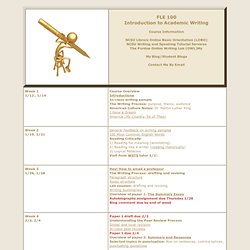
Jean Goodwin. The Orator's Toolkit. An eighteenth century poet quipped: All a rhetorician's rules But teach him how to name his tools.
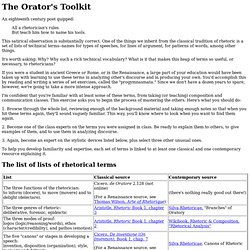
This satirical observation is substantially correct. Commonplace Book. Goodwin.public.iastate.edu/spcom322/makinganargument.pdf. Goodwin.public.iastate.edu/spcom322/goodargument.pdf. Aristotle's Rhetoric Book One. Companion Website for Writing Arguments: A Rhetoric with Readings, Brief Edition. By John D.
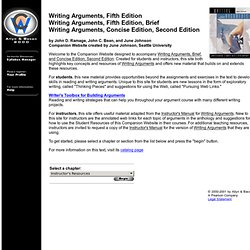
Ramage, John C. Bean, and June Johnson Companion Website created by June Johnson, Seattle University Welcome to the Companion Website designed to accompany Writing Arguments, Brief, and Concise Edition, Second Edition. Created for students and instructors, this site both highlights key concepts and resources of Writing Arguments and offers new material that builds on and extends these resources. For students, this new material provides opportunities beyond the assignments and exercises in the text to develop skills in reading and writing arguments.
Writer's Toolbox for Building Arguments Reading and writing strategies that can help you throughout your argument course with many different writing projects. For instructors, this site offers useful material adapted from the Instructor's Manual for Writing Arguments. To get started, please select a chapter or section from the list below and press the "begin" button. Definitions : Circe Institute. Is the cultivation of wisdom and virtue by nourishing the soul on truth, goodness, and beauty.
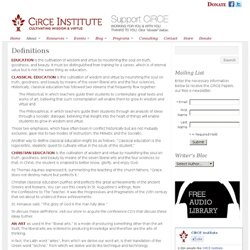
It must be distinguished from training for a career, which is of eternal value but is not the same thing as education. is the cultivation of wisdom and virtue by nourishing the soul on truth, goodness, and beauty by means of the seven liberal arts and the four sciences. Historically, classical education has followed two streams that frequently flow together: The Rhetorical, in which teachers guide their students to contemplate great texts and works of art, believing that such contemplation will enable them to grow in wisdom and virtue and The Philosophical, in which teachers guide their students through an analysis of ideas through a Socratic dialogue, believing that insight into the heart of things will enable students to grow in wisdom and virtue.
As Thomas Aquinas expressed it, summarizing the teaching of the church fathers, “Grace does not destroy nature but perfects it.” St. Grammar. American Communication Association WWW. COMM 4353 American Public Address (Smith) Name of Orator Title of Speech Occasion/Place Delivered Date Speech Delivered I.
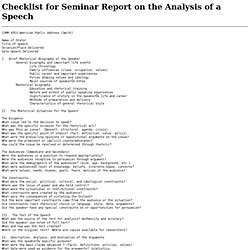
Brief Rhetorical Biography of the Speaker General biography and important life events Life chronology Family influences (class, occupation, values) Public career and important experiences Forces shaping values and ideology Major sources of speakerÕs ethos Rhetorical biography Education and rhetorical training Nature and extent of public speaking experiences Significance of oratory in the speakerÕs life and career Methods of preparation and delivery Characteristics of general rhetorical style II. The Rhetorical Situation for the Speech The Exigence: What issue led to the decision to speak?
What was the specific occasion for the rhetorical act? Why was this an issue? (Bennett: structural, agenda, crisis) What was the specific point of stasis? Aristotle, Rhetoric, spring quarter 1964. Writing in the Sciences. Steven Pinker on Scientific Communication for the 21st Century. Steven Pinker: "The Sense of Style: Scientific Communication for the 21st Century"Harvard College Professor, and Johnstone Family Professor, Department of Psychology, Harvard University Let's face it: most scientists are terrible communicators.
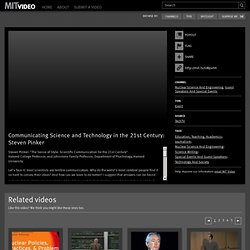
Why do the world's most cerebral people find it so hard to convey their ideas? And how can we learn to do better? ERhet Assignments. For this course, you will fulfill a series of assignments designed to help you understand how to utilize rhetorical principles within a variety of media to produce effective, engaging arguments. The majority of these assignments are components of your central research project for the class. Follow the links below for more complete assignment sheets for each of the listed assignments. Informal Assignments & Requirements (5%). Students will complete many informal writing assignments for this class; these assignments will not be graded, but completion of them is essential for full participation in the class.
These assignments include: Attending class, arriving promptly, and participating actively. Academic Courses Served by Silva Rhetoricae: The Forest of Rhetoric. English 104: College Composition Course - Free Online Courses. Tropes and Figures. HFCL TUTORIAL. Happy Fun Communication Land This tutorial presents a fundamental overview of the study of communication with emphasis on the study of human communication.
The sections may be used in any order, though a comprehensive study would normally begin with section number one and consider each in the order listed below. 1. Index. Opinion Links. Visual Rhetoric. Landmarks. Sp Com 322. Rhetoric & Fallacies. The Art of Being Right. The Art of Being Right: 38 Ways to Win an Argument (1831) (Eristische Dialektik: Die Kunst, Recht zu Behalten) is an acidulous and sarcastic treatise written by the German philosopher Arthur Schopenhauer in sarcastic deadpan.[1] In it, Schopenhauer examines a total of thirty-eight methods of showing up one's opponent in a debate.
He introduces his essay with the idea that philosophers have concentrated in ample measure on the rules of logic, but have not (especially since the time of Immanuel Kant) engaged with the darker art of the dialectic, of controversy. Whereas the purpose of logic is classically said to be a method of arriving at the truth, dialectic, says Schopenhauer, "...on the other hand, would treat of the intercourse between two rational beings who, because they are rational, ought to think in common, but who, as soon as they cease to agree like two clocks keeping exactly the same time, create a disputation, or intellectual contest.
" Publication[edit] A. C. Synopsis[edit] Language and power. Introduction This guide is written for students who are following GCE Advanced level (AS and A2) syllabuses in English Language. This resource may also be of general interest to language students on university degree courses, trainee teachers and anyone with a general interest in language science. On this page I use red type for emphasis. The Informed Writer: Using Sources in the Disciplines. Books reading and writing. Articles and essays. Information, Knowledge, Epistemology, Language. Rhetoric and media. Rhetoric and Composition. Bedford/St. Martin's - The Bedford Bibliography. Commonsense Composition. Teaching Resources. Comprehensive Web Sites This section contains links to comprehensive sites covering a variety of topics important to teachers of writing. Understanding Misunderstandings: How to do a rhetorical analysis.
AP. Reading recommended reading for A.P. Lit exam. Mr. Sudak's Website (for AP Language/Composition & English 11) On English and Writing: Leon Lanzbom. FinancialLiteracyELAN - Secondary - English Lessons & Resources. Words About Words: 5 Essential Books on Language. By Maria Popova What single Chinese men have to do with evolution and insults from Virginia Woolf.
Modern & Contemporary American Poetry. Greek and Roman Mythology. About the Course Myths are traditional stories that have endured over a long time. Poetry! Fantasy and Science Fiction: The Human Mind, Our Modern World. The Fiction of Relationship. English Lit Syllabus: Weekly Schedule and Assignments. SYLLABUS VIEW, English 211.001, Fall 2013 [Last Revised: 09 December, 2013 01:36:02 PM] Today's Most Popular Study Guides. Assignment Sheets. Classroom Activities. Instructional Videos @ Metonymy. Archive. The Online Archive offers a wealth of texts from the Middle Ages through the early Victorian period.